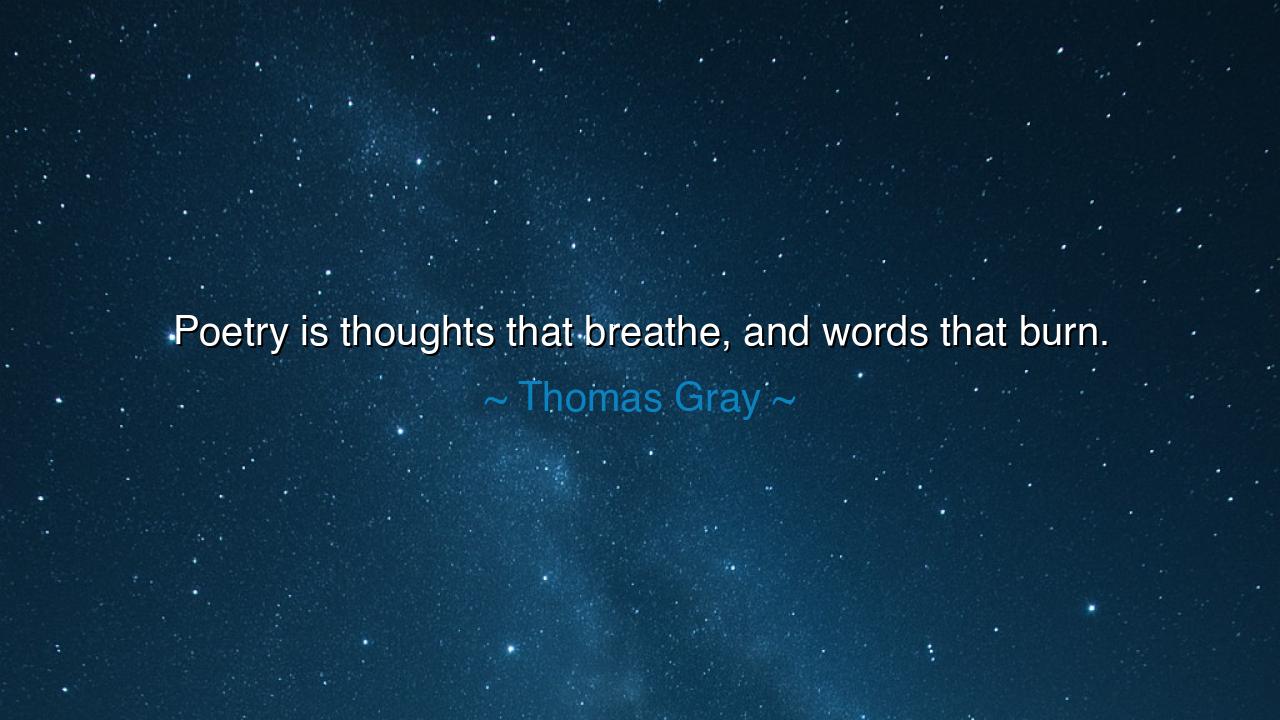
Poetry is thoughts that breathe, and words that burn.






Thomas Gray, the English poet remembered most for his Elegy Written in a Country Churchyard, once gave us a line that is as eternal as the craft itself: “Poetry is thoughts that breathe, and words that burn.” In this utterance, he reveals the living essence of poetry, for it is not cold ink upon a page, nor idle sound upon the air. Poetry is thought alive with spirit—it breathes like a living being—and when it is spoken, it burns, searing itself into the heart of the listener. The phrase is as much a definition of poetry as it is a hymn to its sacred fire.
The ancients knew this truth long before Gray. The rhapsodes of Greece sang Homer’s lines not as lifeless recitation, but as flames carried from the gods to the people. The words of Sappho and Pindar were not meant merely to inform, but to ignite. When Isaiah spoke in ancient Israel, his prophecy was clothed in poetry, each word a spark that burned through centuries. To Gray, this is the nature of true verse: it is not content with existing; it must live and it must blaze.
History offers examples that prove this power. Consider the words of Abraham Lincoln at Gettysburg. They were few, measured, simple. Yet they were thoughts that breathed, for they rose from the living spirit of a wounded nation, and they were words that burned, branding themselves upon the memory of America. Even today, generations not present at that battlefield feel the flame. This is the kind of poetry Gray describes—speech so alive and so fiery that it transcends the moment of its utterance.
There is also a heroic paradox in Gray’s definition. Thoughts, by themselves, are silent, fragile, like shadows. Words, by themselves, can be cold, mechanical, even empty. But when thought and word are fused by poetry, thought gains breath, and words gain fire. One gives life, the other gives passion. Together, they form a force capable of moving armies, healing wounds, and reshaping civilizations. Such is the divine alchemy of poetry, the marriage of breath and flame.
This truth is not confined to literature. In every age, leaders, prophets, and lovers have relied on this same power. When Martin Luther King Jr. declared, “I have a dream,” his vision was not simply political strategy—it was poetry. His words breathed with hope and burned with urgency. They were born of thought but clothed in fire, and thus they moved millions. Without that poetic spirit, his message might have remained in shadow; with it, it became immortal.
So what lesson must we, children of tomorrow, take from Gray’s wisdom? It is this: let your thoughts breathe and let your words burn. Do not live only in silent musings, nor waste your breath on empty phrases. Give life to your ideas—clothe them with sincerity, passion, and truth—so that when they reach others, they will breathe within them, and burn away indifference. For words that do not live are forgotten, and words that do not burn leave no trace.
Practical wisdom follows. When you write, do not aim only to be clever; aim to be alive. When you speak, do not aim only to be heard; aim to ignite. Read the poets who have breathed life and fire into language, and let their example sharpen your own. In conversation, in art, in action, remember that the union of breath and flame is what makes the human voice eternal.
Thus Thomas Gray’s words endure: “Poetry is thoughts that breathe, and words that burn.” Poetry is not mere ornament, but the living fire of humanity itself. To breathe is to be alive, and to burn is to matter. Let your words, then, be both alive and aflame, and they will endure long after your breath has ceased.






LHLinh Ha
This quote by Thomas Gray beautifully encapsulates what makes poetry so powerful—its ability to breathe life into thoughts and make words feel alive. But I wonder, is the 'burning' quality something that’s inherent in all poetry, or is it something that only comes through when the poet strikes a deep emotional chord? Can a poem be impactful even if it doesn't 'burn' in the traditional sense, or must it always evoke strong emotion?
TDDuy Tran Duc
Gray’s quote about poetry really made me reflect on how words can be both intellectual and emotional. When poetry has the power to 'breathe' and 'burn', it feels like it’s more than just a medium for communication—it’s a force that awakens something in the reader. Is every poem capable of achieving this level of emotional impact, or do some poems simply feel more 'alive' than others based on how they resonate with the reader?
TPthanh phong
I love how Gray's quote conveys poetry as something alive and dynamic—almost as if it has its own energy. 'Thoughts that breathe' makes me think of the vitality of the ideas, and 'words that burn' seems to imply the way poetry can leave an impact, almost like a fire that lingers. How do we capture that 'burning' quality in poetry without overdoing it? Can every poem really evoke that kind of intensity?
DDDau Doai
Thomas Gray’s description of poetry as 'thoughts that breathe, and words that burn' really speaks to the power of poetry to evoke emotion. It makes me think about how poems are not just intellectual, but deeply visceral—they move us both mentally and emotionally. But what does it mean for words to 'burn'? Is it about the intensity of emotion, or the way language can ignite passion and stir something deep inside of us?